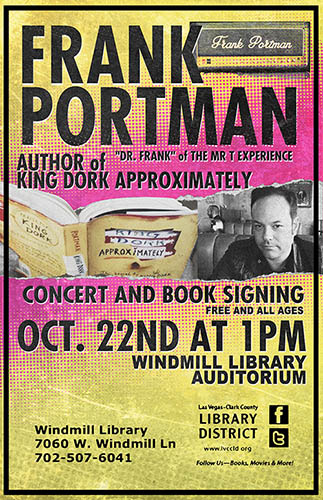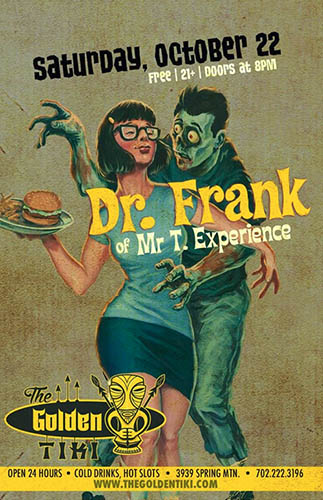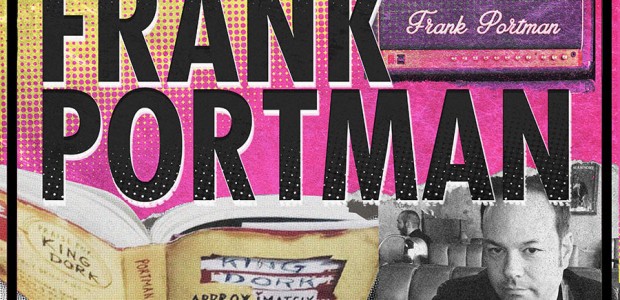Making a 30-year career of writing witty, satirical, and sometimes cynical songs with legendary Bay Area punks, The Mr. T Experience, Frank Portman has since gone on to use those skills to become a successful novelist. Similarly as The Mr. T Experience found success in the alternative D.I.Y. path, Portman’s first and biggest selling novel, “King Dork,” climbed the ladder using the same blueprints, and even some of the same people from Lookout Records that initially helped the band succeed.
Portman’s most recent novel, “King Dork Approximately,” was reissued in paperback earlier this month and along with it, an exclusive digital download of the first Mr. T Experience record in 12 years.
Dr. Frank is going to be performing and signing books at the Windmill Library this Saturday, Oct. 22 at 1 p.m. and performing at the Golden Tiki later that same day, so in advance of that local appearance, I sat down to talk to him about the process of transitioning from life as a punk to being a serious contender in the literary world.
First off, now that “King Dork Approximately” is out in the world, do you feel like a weight has been lifted off your back?
When you have a release, the weight is never off your shoulders. You have to try to keep stirring the pot and keep it going because the world has a short attention span. You’re competing with a lot of things, so it’s a lot of work all the way through. There’s no release ever.

What’s the difference between releasing an album as opposed to a book?
It’s similar in a lot of ways. The big difference is I had a very successful book, my first book, “King Dork,” and that was very unusual because for the previous twenty years I’ve been putting out records with bit of success here and there, but nothing like that. That was such a big explosion and that was very cool. But you’re only as good as the last thing you did, and it can always be a struggle to follow up whatever’s successful. That’s just the case with all commercial products and all art. It’s always a big question mark what’s going to happen to it.
Did your career in punk rock help better prepare you transition into being a novelist?
Nothing prepared me for the whirlwind of the sudden success of the book. When “King Dork” happened we, (me and my friend who was helping me as a publicist who’s a former Lookout publicist, Tristan) did a lot of the things that we learned and that we practiced with the punk rock records and the Lookout Records label. A lot of it actually was unusual to do in the book world and it did have an impact, but it’s always an uphill battle.
Did you know from the start that a new MTX album would accompany the latest book?
Initially, just as a fantasy. A “wouldn’t it be cool if” sort of situation. If I could get it together to coordinate the rock ‘n roll with the book in a way that they both inform and support each other, then that would be really great, but it’s hard to make that happen. I would try it in little ways. Every time I’d put out a book I would write a theme song. There were songs associated with the books [I was writing].
As far as a real release and a real coordinated effort, that takes a lot. It’s hard to do one. It’s hard to do both at the same time, and it’s hard to make them both happen concurrently, and this time I just managed to…I mean, it was a determined effort to do it and I had a lot of help from people. My whole band and everyone I knew was trying to help out to make it happen.
Do you have to navigate differently between the fans of the novels and the fans of your music, or is there overlap?
There are two different audiences, but there’s also an overlap. Part of the overlap involves people who are fans of the music that don’t have the time to read the books, for instance. [They’re] very willing to support me in all of my endeavors and they’ll buy a book just to do it, but what I’m hoping is that they’ll go and investigate. There’s a whole novel that tells you what’s going on with these songs. Certainly, the other way around, there are probably more readers who don’t have much familiarity with the music.
You know, it’s a little early to tell how much of that is going to happen, but I’m hoping that it happens a least sometimes. I know that as a fan of music and a fan of novels, when I really like something I always welcome more. There are a lot of fans of my books as well as a lot of fans of my music. I think, from either direction you can jump to the other. I think that’s really cool.
When “King Dork” came out some people thought that some female characters in the book were over-sexualized, even though this is a book about a sophomore in high school.
Yeah, number one, what you just said is true. If you’re going to write authentically about a teenage boy, you can’t be an authentic teenage boy without dealing with sex. It’s a big part of life for everybody, particularly a teenage voice. I think that authenticity when you are writing in the voice of a character is the most important thing. The other thing is that it’s a satire. Nothing is exaggerated in it. It’s trying to put across a mood of a certain type of experience and hopefully doing it in a way that’s a bit amusing.
There’s also a tone in these kinds of satirical treatments where, you know, you’re displaying what you might call “human frailty.” You shouldn’t pull punches when you do that. [Some people] think characters in books should all be “paragons of virtue” where everything they do is an example of how everyone should behave. I think in a lot of children’s literature, so called, there’s a tendency to feel like the characters in books should be setting good examples for children. I understand that point of view, but I don’t agree with that. That’s not the role of art. I think you take your readers seriously if you’re going to write for them.

At the time where The Mr. T Experience seemed to be coming to an end, did you know that being a novelist was going to be your next step?
No, I didn’t really have a plan. When the last album on Lookout Records came out in 2004 [Yesterday Rules], we did a tour that ran concurrently to the whole music industry sort of completely collapsing. People weren’t buying records anymore, it was basically like this was dead. There was nowhere to go, and nothing to do. I was lost because I didn’t have a plan, and that’s when I started writing “King Dork.” So then I had years of vaguely doing that, and I didn’t have any clue.
What I realize now is that with a lot of these songs I had been writing, a variety of different voices that the songs were written in [were a] proto-Tom Henderson. He was the voice in a lot of these songs. So I thought, ‘write a novel with a sensibility of some of these songs. What would a narrator with this voice look like?’ As I kept doing that I did kind of figure out some stuff about that voice, and the character did organically develop, based on a long time experience of learning how to write that kind of song.
Interestingly, to me anyway, the songs that I wrote specifically to be Tom Henderson songs, his voice in lyric form and song form, are different from those original songs that spawned him. You write 800 pages of internal monologue of a character, you get to know things about them you might not know before you do that. When you are doing something artistic, the point where the art is most poignant is where you are discovering things along with executing them. That is certainly the case with writing these books as well as the development of songwriting that went parallel with that process.
Thanks Frank! Come pick up a copy of “King Dork Approximately” and hear him sing some The Mr. T Experience songs at the Windmill Library TOMORROW, Saturday, Oct. 22 at 1 p.m. and at the Golden Tiki at 8p.m. the same day.





No Comments